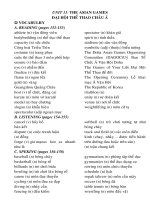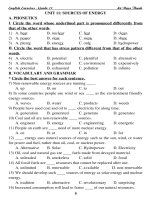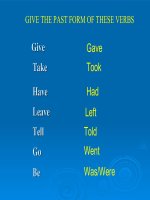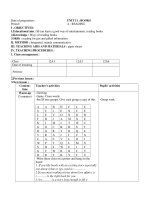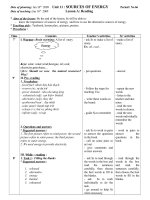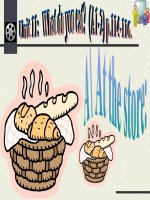unit 11
Bạn đang xem bản rút gọn của tài liệu. Xem và tải ngay bản đầy đủ của tài liệu tại đây (701.28 KB, 16 trang )
Week: ….. Period: ….
Date:…………………………………
UNIT 11: OUR GREENER WORLD
Lesson 1: Getting Started – Let’s “go green”!
I. Objectives:
By the end of this lesson, students can use vocabulary and structure to talk about tips on how to
“go green”.
II. Language Focus:
1. Vocabulary: the lexical items related to the topic “Our greener world”.
2. Structures:
Conditional sentences – type 1
III. Method: Communicative approach
IV. Teaching ads: Course book, CD player, picture.
V. Procedures:
T
Teacher’s Activities
- Ask Ss to look at the picture and
answer the questions.
- Quickly write Ss’ answers to
question 3 on the board.
- Play the recording.
- Ask Ss if their guesses on the board
are correct.
- Ask Ss to work independently.
- Allow them to share answers before
discussing as class.
Ss’ Activities
- Answer.
- Listen and read
- Individual work
- Write the correct answers on the
board.
- Pair-work
- Ask Ss to give their answers
without reading the conversation
again. Then ask them to read the
conversation and check their
answers.
- Confirm the correct answers.
- Individual work
- T asks SS to read the conversation
again to find the expressions.
- Ask Ss to guess the meaning of
Content
* Presentation:
*Questions:
1. Who are they?
2. Where are they?
3. What might they be
talking about?
* Practice:
1a- Read the conversation
again and complete the
following sentences. Use no
more than three words in each
blank.
Key:
1. on a picnic
2. reusable; natural
3. the check-out
4. a reusable
5. cycling
1b. Base on the ideas in the
conversation, match the first
half of the sentence in column
A with its second half in
column B.
Key:
1. b 2. c 3.a
1c. Find the expressions in the
each expression. Explain the
meaning if necessary.
- Pair –work
- Have Ss work in pairs to put a
suitable expression in each blank and
then practice the conversation.
- Check Ss’ answers by asking some
pairs to act out the conversation.
- Ask Ss to so this exercise
individually then compare their
answers with a classmate.
- Individual work
- Play the recording for Ss to listen,
check and repeat their answers.
- Listen and
repeat.
- Ask Ss to match the causes in
Column A with the effects in column
B.
- Pair-work
- Have Ss to work in group of six and - Group-work
follow the steps to play the game.
conversation. Check what they
mean.
Key:
1. I understand.
2. Used to introduce a new
subject for consideration
or to give further
information.
3. Used to say ‘no’ or ‘not’
strongly.
1d. Fill each blank with a
suitable expression.
Key:
1. I see
2. Not at all
3. By the way
2- There are a lot of
environmental problems today.
Write each problem in the box
under the picture.
Key:
1. soil pollution
2. deforestation
3. water pollution
4. noise pollution
5. air pollution
3. Now, listen, check and
repeat the answers.
Watch out!
To express effects we can use
the structures ‘to make sth/sb
do sth’ or ‘to cause sth’.
4. Match the causes in Column
A with the effects in column B.
Key:
1. b 2. d 3. e 4.c 5.a
* Production:
5. Game
Which group is the winner?
*Homework:
- Practice the conversation.
- Prepare the next lesson
(A closer look 1)
Week: ….. Period: ….
Date:………………………………….
UNIT 11: OUR GREENER WORLD
Lesson 2: A Closer Look 1
I. Objectives:
By the end of this lesson, students can Pronounce correctly the sounds /Α:/ and /{/ in
isolation and in context; Use the lexical items related to the topic “Our greener world”.
II. Language Focus:
1. Vocabulary: the lexical items related to the topic “Our greener world”.
2. Structures:
Conditional sentences – type 1
III. Method: Communicative approach
IV. Teaching ads: Course book, CD player, picture.
V. Procedures:
T
Teacher’s Activities
Ss’ Activities
- Have Ss read the
- Pair-work
information in the table and
draw a line from a symbol in
column A to matching word
in column B and meaning in
column C. Ss work in pairs to
compare their answers before
giving T the answers.
- Have Ss work in pairs to do
this activity.
- Call on Ss from different
pairs to go to the board and
write the words.
- Pair-work
- Ask Ss to work in pairs and
put the words from 2 in
appropriate groups. Draw the
table on the board and call
three Ss to go to the board
and write their answers.
- One word can belong to
more than one group.
- Individual work
Content
* Presentation:
Vocabulary
1. The three Rs stand for Reduce –
Reuse – Recycle. Draw a line from a
symbol in column A to the matching
word in column B, and meaning in
column C.
Reduce – Reuse - Recycle
• Reduce: using something less.
• Reuse: using something again.
• Recycle: Creating new products
from used materials.
* Practice:
2. Write a word in the box under each
picture.
Key:
1. rubbish
6. noise
2. plastic bags
7. paper
3. glass
8. bulb
4. plastic bottle
9. water
5. can
10. clothes
3. Put the words from 2 into groups.
One word can belong to more than one
group.
Key:
REDUCE
Rubbish, plastic bag, noise, plastic
bottle, paper, water.
REUSE
Plastic bag, glass, plastic bottle, can,
paper, bulb, water, clothes.
RECYCLE
Rubbish, plastic bag, glass, plastic
bottle, can, paper, bulb.
- T whole class
- Play the recording for ss to
listen to the song. Play the
recording again for Ss to sing
along. Ask some Ss to sing
the song.
- T whole class
- Have Ss read out the words
first. Then play the recording
for them to listen and repeat
the words. Play the recording
as many time as necessary.
- Individual work
- Play the recording again.
Ask Ss to put the words in
the correct column while they
listen.
- Individual work
- Pair -work
4. Listen to the “Three Rs’ Song. Then
sing along.
Pronunciation /Α:/ and /{/
5. Listen and repeat. Pay attention to
how the understand part is
pronounced.
Fast hard bag plastic
glass apple dance answer
activity
afternoon
6. Listen again and put the words in
the correct column.
Key:
/Α:/: last, staff, half
/{/: fan, hand, understand, tap, can
7. Read the conversation. Write /Α:/
or /{/ below wach underline letter.
- Have Ss do this exercise
individually first.
- Then compare their answers
with a partner.
Play the recording and pause - Pair -work
after each word which has the
underlined for Ss to check
their answers. Ask them to
practice the conversation in
pairs.
* Production:
8. Listen to the conversation and check
your answers. Practice the
conversation with a classmate.
*Homework:
- Learn vocabulary by heart.
- Prepare the next lesson
(A closer look 2)
Week: ….. Period: ….
Date:………………………………….
UNIT 11: OUR GREENER WORLD
Lesson 3: A Closer Look 2
I. Objectives:
By the end of this lesson, students can use conditional sentences – type 1 correctly and
appropriately.
II. Language Focus:
1. Vocabulary: the lexical items related to the topic “Our greener world”.
2. Structures:
Conditional sentences – type 1
III. Method: Communicative approach
IV. Teaching ads: Course book, CD player, picture.
V. Procedures:
Teacher’s Activities
Ss’ Activities
- Ask Ss to read the
- T-Whole class
conversation again. Draw
their attention to the two
conditional sentences – type 1.
Elicit the form from Ss. Have
ss look at the Grammar box
and explain.
- Give some examples.
Content
* Warm-up:
Grammar
Conditional sentences – type 1
1. Listen again to part of the
conversation from Getting
Started. Pay attention to the
conditional sentences.
Ex:
- If you use less paper, you will
save a lot of trees.
- Ask Ss to do this activity
quickly the give the answers
to T.
- Write their answers on the
board and confirm the correct
answers.
- Individual work
* Practice:
2. Write the correct form of the
verb in brackets.
Key:
1. is; will plant
2. recycle; help
3. will save; don’t waste
4. will have; use
5. isn’t/ is not; will be
- Individual work
- Have Ss do this exercise
individually, then compare
their answers with a
classmate. Call on some Ss to - Pair work
read out the sentences.
- Have Ss to do this activity in
pairs.
- Ask Ss to write their
sentences on the board.
- Ask for feedback form other
Ss.
- Confirm the correct answers.
- Individual work
- Have Ss do this exercise
individually, then compare
their answers with a
classmate.
- Call on some Ss to write
their answers on the board.
- Ask other for comments.
- Correct any mistakes.
- Give them the suggested
sentences.
3. Match an if-clause in column A
with a suitable main clause in
column B.
Key:
1. c 2. e 3. b 4. a 5.d
4. Combine each pair of sentences
below to make a conditional
sentence – type 1.
Key:
1. If we pollute the air, we will
have breathing problems.
2. If people pollute the water, a
lot of fish will die.
3. If we cut down trees in the
forest, there will be more
floods.
4. If the soil is polluted, the
plants will die.
5. If there is noise pollution,
people and animals will have
hearing problems.
5. Use your own ideas to complete
the sentences below. Share your
sentences with a classmate do you
have the same sentences.
Key:
1. If you walk to school, you will
have reduce air pollution.
2. If you use recycle paper, you
will save trees.
3. If the Earth becomes hotter,
the sea level will rise.
4. If parents teach their children
about the three Rs, children
will help the environment.
5. If you want to save a lot of
electricity, you will have to
turn off all the lights before
going out.
- Divide class into groups (A
and B) and give each Ss a trip
of paper. Ss from group A
A
B
write an if-clause. Ss from B
write the main clause.
- Group - work
* Production:
6. Fun matching.
*Homework:
- Practice more.
- Prepare next lesson
(Communication)
Week: ….. Period: ….
Date:………………………………….
UNIT 11: OUR GREENER WORLD
Lesson 4: Communication
I. Objectives:
By the end of this lesson, students can talk about ways to ‘go green’.
II. Language Focus:
1. Vocabulary: the lexical items related to the topic “Our greener world”.
2. Structures:
Conditional sentences – type 1
III. Method: Communicative approach
IV. Teaching ads: Course book, CD player, picture.
V. Procedures:
T
Teacher’s Activities
Ss’ Activities
- Review the grammar
- T whole class
points that may be used in
this lesson. Some grammar
points are: conditional
sentences – type 1 and
questions to ask about
frequency (How often…)
- Go through the extra
vocabulary with ss.
- Have Ss read the
questions quickly and
make sure that they know
what to do.
- Ask Ss to answer the
questions individually,
then turn to page 53 to
check their answers and
count the points.
- Ask some Ss to speak out
the points they received.
- Ask Ss to work in pairs.
One is the interviewer and
the other is the
interviewee.
- Ask Ss to do the
- Individual work
Content
* Presentation:
Grammar points:
• Conditional sentences – type 1.
• Questions to ask about frequency.
Extra vocabulary:
• Do a survey
• Recycling bin
• Wrap
• Be in need
• Breeze
• Invite
* Practice:
1. The 3Rs Club in your school is
doing a survey on how ‘green’ the
students are. Help them answer the
following questions.
SURVEY
How ‘Green’ Are You?
- Pair-work
2. Interview a classmate. Compare
his/ her answers with yours. How
many different answers have you
got?
- Report your classmate’s answers
to the class.
interview in about 7
minutes and to note down
their friends’ answers.
- The interviewer then
share their answers with
their friends and find out
how many different
answers they have.
- Call some Ss report the
results of their interview to
the class.
- Ask SS to work in
- Group-work
groups.
- Give each group a large
piece of paper. Ss have to
write two more questions
on this paper. When time is
up, ask the groups to stick
their questions on the
board or on the wall. Read
the questions out aloud.
- Ask Ss for comments on
the questions. Give
feedback on the questions.
Finally, the class votes for
the best questions.
* Production:
3. Work in groups. Think of two
more questions to add to the survey.
- Share your group’s questions with
the class. Vote for the best
questions.
*Homework:
- Prepare the next lesson :
(Skill 1)
Week: ….. Period: ….
Date:………………………………
UNIT 11: OUR GREENER WORLD
Lesson 5: Skill 1
I. Objectives:
By the end of this lesson, students can read for specific information about tips on how to be
‘green’.
II. Language Focus:
1. Vocabulary: the lexical items related to the topic “Our greener world”.
2. Structures:
Conditional sentences – type 1
III. Method: Communicative approach
IV. Teaching ads: Course book, CD player, picture.
V. Procedures:
T
Teacher’s Activities
Ss’ Activities
- Tell Ss they are going to
- Group-work
read some tips that can help
them to become ‘green’.
Content
* Presentation:
Read the 3Rs club poster about tips to
become ‘green’.
(Page 54)
- Ask SS to read the tips
quickly and locate the
words/ phrases in the text.
swap
charity
reusable
- Individual work
* Practice:
1. Find these words or phrases in the
text and underline them.
creative
Recycling bin
- Individual work
- Ask Ss to do this exercise
individually and then
compare their answers with
a classmate.
- Ask for Ss’ answers.
Confirm the correct
answers.
- Ask Ss to give some
examples with the words/
phrases.
- Pair-work
- Have Ss read the tips
again to answer the
questions.
- Set a strict time limit to
ensure Ss read quickly for
information.
- Ask ss to compare their
- Group-work
answers before giving the
answers to T.
- Ask them to give evidence
when giving the answers.
2. Match the words with their
meanings.
Key:
• Creative: unique and interesting.
• Charity: giving things to people
in need.
• Swap: give something to a person
and receive something from him.
• Reusable: can be used again.
• Recycling bins: containers for
things that can be recycled.
3. Answer the questions.
Key:
1. Recycling bins
2. Give them to charity or swap
them with your friends or
cousins.
3. Refillable ones.
4. Turn the tap off when brushing
your teeth or washing the dishes.
5. Reusable water bottles.
4. Work in groups.
Do you think you can follow the tips
for ‘going green’?
- Ask Ss to work in groups
and discuss the questions.
- Ask SS to work in groups
and find creative ways to
reuse the items indicated in
- Group-work
* Production:
5. The last tip tells you to find
creative ways to reuse items before
throwing them away. Can you think of
the book.
any creative ways to reuse?
a) Old envelopes?
b) Used water bottles?
c) Used books?
*Homework:
- Prepare the next lesson :
(Skill 1)
............................................................................................................................................................
............................................................................................................................................................
............................................................................................................................................................
............................................................................................................................................................
............................................................................................................................................................
............................................................................................................................................................
Week: ….. Period: ….
Date:………………………………….
UNIT 11: OUR GREENER WORLD
Lesson 6: Skill 2
I. Objectives:
By the end of this lesson, students can listen to get specific information about ways to make
the school a “green’ place.
II. Language Focus:
1. Vocabulary: the lexical items related to the topic “Our greener world”.
2. Structures:
Conditional sentences – type 1
III. Method: Communicative approach
IV. Teaching ads: Course book, CD player, picture.
V. Procedures:
T
Teacher’s Activities
- Tell Ss that the 3Rs Club is
looking for a new president.
Quickly elicit the necessary
qualities of the club
Ss’ Activities
- T whole class
Content
* Presentation:
Listening
A new president wanted.
• Are you creative?
• Do you want our school to be
a ‘green’ place?
• What will you do if you
become the president?
• Raise your voice and become
our president!!
president from Ss and write
them on the board.
- Have Ss read the
advertisement for this
position.
- Ask them what they will do
if they become the club
president.
- Have Ss guess the
- Individual work
word/number to fill in each
blank and write on the
board.
- Play the recording and ask
Ss to listen to check their
guess.
- Ask for Ss’ answers and
write them on the board next
to their guesses.
- Pair-work
- Ask Ss to read the
statement in exercise 2 and
write T or F at the end of
each statement without
listening to the recording.
- Have ss compare their
answers in pairs before
giving T the answers.
- Ask Ss work in pairs and
interview each other to find
out the three things they will
do if they become club
Name:
……………………
president.
Ask Ss to take
about each other’s
Ideanotes
1: ……………………
ideas. Ask Ss to expand the
and giving examples. If
Ideaidea
2: ……………………
time allows, have some Ss
Ideapresent
3: ……………………
their friend’s ideas
or write the ideas on the
board.
* Practice:
1. Listen to two Ss talking about
what they will do if they become the
president. Put the words or a
number in each blank to complete
the table.
Key:
1. 6A
5. 6E
2. Recycling
6. Bus
3. Saving lights
7. Gardening
4. Book
8. Uniform
2. Write T (true) or F (false)
Key:
1. T
4. F
2. F
5. T
3. T
- Pair-work
- Ask Ss to write their
- Individual work
paragraph individually based
Writing
3. Interview a classmate. Ask him or
her what three things he or she will
do are if he or she becomes the
president of the 3Rs club. Take notes
below.
* Production:
4. Write about your classmate’s idea
in 3. Do you think your classmate
on the suggestions in the
book.
will be a good club president.
• His/her name and class.
• Idea 1 + explanation/examples
• Idea 1 + explanation/examples
• Idea 1 + explanation/examples
• Will he/she be a good club
president?
*Homework:
- Write your paragraph into your
notebook.
- Prepare the next lesson :
(Looking
back)
Week: ….. Period: ….
Date:………………………………….
UNIT 11: OUR GREENER WORLD
Lesson 7: Looking Back
I. Objectives:
By the end of this lesson, students can review some vocabulary and grammar
they’ve learn in unit 11.
II. Language Focus:
1. Vocabulary: the lexical items related to the topic “Our greener world”.
2. Structures:
Conditional sentences – type 1
III. Method: Communicative approach
IV. Teaching ads: Course book, CD player, picture.
V. Procedures:
Teacher’s Activities
- Ask SS to do this activity
individually then compare their
answers with a partner.
- Ask three Ss to go to the
board, each writing a word web
on the board. Elicit other words
from Ss to add to the webs.
- Follow the example in the
book, ask Ss to work in pairs to
ask and answer questions about
the 3Rs.
- Call on some pairs to act out
their dialogues. Comment on
Ss’ performance.
- Ask SS to do this activity
individually then compare their
answers with a partner.
Ss’ Activities
- Pair-work
Content
* Presentation:
Vocabulary
1. Add more words to the word
webs below.
Key:
• Reduce: water, gas, paper,
rubbish, electricity.
• Reuse: envelope, can, light
bulb, bottle, plastic bag.
• Recycle: can, book, plastic
box, plastic bag, newspaper.
- Individual work
2. In pairs, ask and answer
questions about 3Rs.
Example:
A: Can we reduce water use?
B: Yes, we can.
A: How?
B: Don’t take a bath.
- Individual work
- Pair-work
3a. Complete the words or
phrases.
Key:
1. Deforestation
2. Air pollution
3. Water pollution
4. Noise pollution
5. Soil pollution
3b. Matching
Key:
1. b
2. e
3. a
4. c
5.
-Ask Ss to do the exercise
individually. Then SS check
their answers with their partner
- Get feedbacks and correct if
necessary
- Individual work
- Ask Ss to do the exercise
individually. Then SS check
their answers with their partner
- Ask some Ss to write their
answers on the board. Give
feedback.
- Individual work
-Ask Ss to work in groups of
four. One student interviews
the other three group members
and notes down their answers.
Ask some Ss to report the
results to the class.
- Group-work
* Practice:
Grammar
4. Write the correct form of each
verb in brackets.
Key:
1.Is; will rise
4.Don’t hav
2.Rises; will disappear
will be
3.Reduce; will have
5.Are; will
5. Combine each pair of
sentences below to make a
conditional sentence – type 1.
Key:
1.If Ss recycle and use recycled
materials, they will save
energy.
2.If we use the car all the time,
we will make the air dirty.
3.You will save electricity if
you turn off your computer
when you don’t use it.
4.People will stop using so
much energy if they want to
save the environment.
5.If you see a used can on the
road, what will you do?
* Production:
Communication
6. Work in groups. Interview
three classmates and note down
their answers. Share their
answers with the class.
Finished! Now you can………
*Homework:
- Do “project” on page 57.
- Prepare next lesson :
(Unit 12: Robots Lesson 1: Getting Started)
